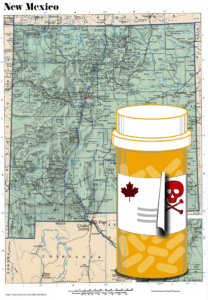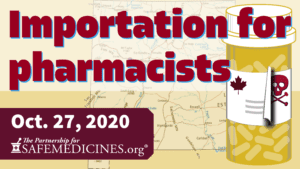Drug Importation in New Mexico: An Overview
 Synopsis:
Synopsis:
In March 2020, the Governor of New Mexico signed SB1, a bill which creates a "wholesale prescription drug importation program" to be administered by New Mexico's Department of Health.
New Mexico published the draft of its application to the U.S. Department of Health and Human Services and submitted the final version to HHS in December 2020. Consult PSM's analysis on the right to learn more about their proposed plans.
Official actions and statements
- Legislative Health and Human Services Committee meeting, August 11, 2022 update: recording | slides (.pdf)
- Submitted final application in December 2020.
- Released draft application to U.S. HHS, October 28, 2020
- Governor Lujan Grisham signed SB1 into law March 4, 2020
- Bill introduced to the New Mexico Senate January 15, 2020
Planning documents
News
- N.M. May Get Med Imports From Canada Under Trump Order, September 25, 2020
"An outline of the program must be submitted by Dec. 15 to the U.S. Health and Human Services Department, Morgan said, adding that the public will have a chance to comment on the program before then."
Op-eds from the Experts
One proposed amendment which could delay, or derail prompt passage, would allow importation of drugs from other countries which have not been inspected or approved by the FDA. Because the FDA ensures strict oversight of purity and effectiveness of the drugs in our supply chain, this proposal is dangerous. Everyday customs officials are finding counterfeit drugs which are laced with dangerous ingredients like fentanyl, mercury, lead, or other toxins.
So, what does all of this have to do with importing drugs from a friendly nation like Canada? The simple, inarguable fact is that, once we open up our drug supply, we can no longer ensure the safety of the products in it.
Instead of wasting time and money on dangerous and faulty importation proposals, Congress should encourage the FDA to speed up the drug approval process and reduce the cost of program and application fees for future drug development. In 2022, the application fee for a human drug application will cost $1.6 million for drugs that don’t require clinical data and $3.1 million for medicines that do need clinical data.
PSM's Analysis of New Mexico's Application
New Mexico's October 2020 draft application was very close to its final submission in December
To get up to speed:
- Read "What is Drug Importation?," a short primer and guide to keeping New Mexico residents safe and learning the myths of Canadian drug importation.
- Catch up on our analysis:
 Watch our video and read the accompanying blog to hear our analysis of New Mexico's draft application.
Watch our video and read the accompanying blog to hear our analysis of New Mexico's draft application.
PSM Coverage:
On Tuesday, December 2, 2020, New Mexico conducted their one and only public hearing on their plan to import medicine from Canada (over Canada’s objections). While the hearing was largely a formality, there was some interesting testimony.
The state of New Mexico released a draft of its Canadian drug importation plan. PSM analyzed the plan, paying particular attention to concerns pharmacists might have about how drug importation might affect their patients and business…
The New Mexico Pharmacists Association recently sent their own letter to members of Congress expressing their concerns about allowing drug importation. PSM had the chance to speak with their executive director to learn more about the realities and misconceptions that people have about prescription drugs and drug importation…
Additional Resources:
Recent Statements Opposing Canadian Drug Importation
- American Pharmacists Association
- Canadian Pharmacists Association
- American Society of Health-System Pharmacists
- Canadian Society of Hospital Pharmacists
- National Association of Boards of Pharmacy
- Canadian Association for Pharmacy Distribution Management
Prescription Drugs in Wyoming, Evaluating State Policy Options For Lowering Costs (October 1, 2020)
The Wyoming Department of Health concluded that it is "virtually impossible to guarantee that consumers will actually see savings, particularly in the case of Canadian drug importation. Basic economics also suggests fundamental problems with this plan that make it unsustainable in the long-run."


